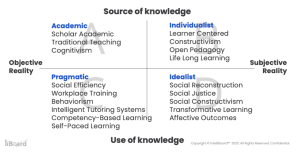When we design learning analytics tools for our clients, one thing we keep in mind is that definitions like “learning” and “success” change depending on the type of institution and the priorities of the institution, instructors, and learners. One way to look at this considers different types of learning on a quadrant:

These different definitions and priorities of learning are studied in the field of Curriculum Theory, and while most institutions, instructors, and learners have more than one of these quadrants in mind in any given learning situation, which ones have the highest priority has a significant impact on the appropriate types of learning analytics.
In the case of Academic learning, accurate assessments used to rank students and identify those with the most potential for scholarly advancement in the field take priority. Tools like quiz question analytics and grade curves are emphasized, and deep engagement with content, in the form of time spent, tends to be a positive indicator. Other learning analytics that can be helpful in this model include tracking multiple revisions of a document, originality checking metrics, and the use of tools like video and in-context feedback to allow instructors and peers to model scholarly behavior.
On the other hand, the Individualist curriculum is focused on encouraging learner goal-setting and lifelong learning. Learning analytics tools for this model focus on tracking student achievement of their own goals, construction of knowledge using tools like mind maps, improvement over time in learner-centered portfolios, and tools that encourage self-assessment of learning and resources.
The Pragmatic curriculum is a focus of many learning analytics tools. The goal is to help as many learners as possible achieve a standard set of competencies, so tools that detect learners at risk of not achieving competencies or completing courses with a minimum grade are the focus, including tools that detect which learners seem to be spending an unusually large amount of time on content, indicating that they might be struggling or stuck. Here, learning analytics also includes tools to review course design for efficient coverage of content and the use of tools to personalize learning to make it more efficient.
Finally, the Idealist curriculum emphasizes transformational learning in a socio-cultural setting. Instead of attempting to predict outcomes, learning analytics in this curriculum focuses on supporting the inclusion and full participation of all learners and the use of group decision-making tools and effective tools like sentiment analysis.
While there are certainly learning analytics tools common to all curricula, only the most basic questions can be addressed without considering the curriculum focus of the institution, instructors, and learners. The most powerful learning analytics tools will take these key definitions into account.
Your Custom Learning Analytics Solution
Ready to use these elements to create your organization’s custom learning analytics system? Talk to our experts to learn how we can build a learning analytics solution tailored to your needs.

Ann McGuire is an experienced marketer with more than 20 years creating content, marketing communications programs, and strategies for tech firms. She reads, writes, and lives in New Haven, CT with her husband and two needy cats.
Resources
Explore Learning Analytics Insights
Identify Learning Performance Gaps to Link Corporate Training to ROI
Discover how to achieve business impact by leveraging data from across your training platforms and tracking the measurable objectives.
Voice and Choice: Why Student Agency is Necessary for Learning
Learn why it matters to foster student agencies for students and educators and what strategy of foster student agency you need.
Virtually Unstoppable
Explore why the strategic deployment of technology adopted in 2020 also must come with a more strategic use of data.




